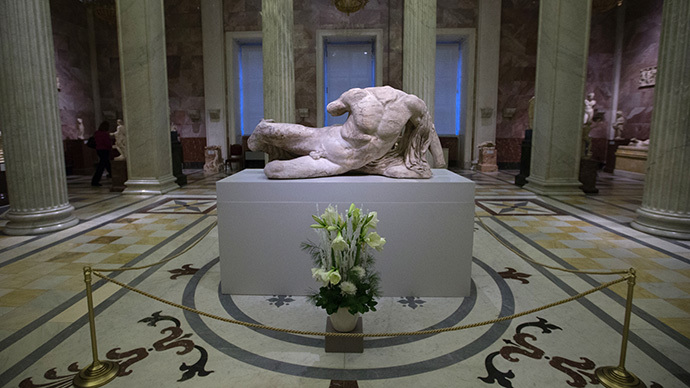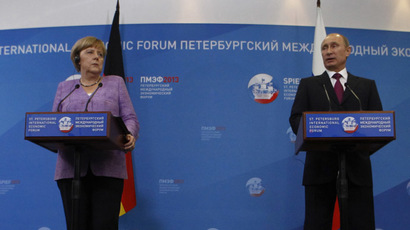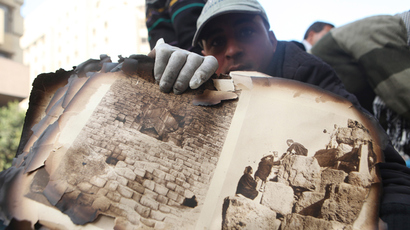Stumbling block: Greeks offended by Brits lending ancient sculpture to Russia

In a worldly gesture to help Russia's Hermitage museum celebrate an anniversary, the British Museum has 'secretly' sent a 2,500 years old Parthenon sculpture to St. Petersburg. The move infuriated Greeks, who have long tried to reclaim the ancient piece.
The reclining marble sculpture of the river god Ilissos, which 25 centuries ago decorated the facade of Greece's Parthenon temple, has now been moved for the first time in some 200 years - from London's British Museum to Russia's Hermitage in St. Petersburg.
The headless Ilissos, which is considered to be one of the greatest works of ancient Greek art, is part of the so-called Elgin Marbles collection, which the British Museum acquired in the early 19th century. The artifacts were brought to the UK by British diplomat Thomas Bruce, the Earl of Elgin, who sold them to the Parliament in 1816, and the collection was then presented to the museum and given the earl's name.
This is the first time @britishmuseum has been asked to lend any of the #Parthenon sculptures http://t.co/i9X0F6kt1jpic.twitter.com/KD1SpkPDCM
— British Museum (@britishmuseum) December 5, 2014
For decades, the Elgin Marbles have been rocks of offence for Greece and a source of one of the world’s longest-running cultural disputes. With Athens arguing that the art works were removed from their native land illegally, while the country was under Turkish occupation as part of the Ottoman Empire, London says there is no legitimate claim to the statues.
READ MORE: Loot or trophy? Russia and Germany in choppy waters over captured WWII art
None of Greece's several high-profile campaigns to have the "stolen" items returned - with UNESCO's involvement and the recent participation of lawyer and activist Amal Clooney, the wife of actor George Clooney, have ended in Athens' favor.
Simply Greek..The British Museum sent our Marbles to the Hermitage St. Petersburg.. #SHAME..@alcissa@pany1galanispic.twitter.com/i44XXvMQNJ
— Lydia (@llm_s) December 5, 2014
The British loan to Russia - with the sculpture having left Britain for the first time ever - only added fuel to the flames, with Greece reacting with fury. Calling the move a "provocation," Greek Prime Minister Antonis Samaras said the sculpture was part of the country's history and culture, which "cannot be cut up, borrowed and handed over."
The minister's statement also questioned one of the British arguments for keeping the marbles in London and not being moved - for being too fragile.
"You see, they can be moved," head of the New Acropolis museum, Dimitris Pantermalis, told Reuters, expressing hopes that the current loan could demonstrate the collection could one day be displayed in Greece.
#Turkey PM Davutoğlu condemns lending of Parthenon statue from British Museum to Hermitage Museum in Russia.
— Yannis Koutsomitis (@YanniKouts) December 6, 2014
Saying the loan was "an offence not only to the Greek people but to the entire international community," the International Association for the Reunification of the Parthenon Sculptures, which represents volunteer committees in 16 countries, also criticized the British Museum's decision.
Both Russian and British cultural institutions were excited and happy with the act. "The Trustees of the British Museum... believe that the great things of the world should be shared and enjoyed by the people of the world," Richard Lambert, chairman of the trustees, said in a statement, adding that they were delighted the "beautiful object will be enjoyed by the people of Russia."
@hermitage_eng 'A Masterpiece from @BritishMuseum' opened today in the Roman Yard of the New Hermitage pic.twitter.com/9nL93rL0gj#elginmarbles
— Mr Skylord (@mr_skylord) December 6, 2014
Writing in the British Museum blog, its director Neil MacGregor said the two museums were "sisters, almost twins, the first great museums of the European Enlightenment." He also called the loaned sculpture "a marble ambassador of a European ideal."
The piece of ancient art - which went on public display at the Hermitage on Saturday - arrived in Russia amid great secrecy, with only a small group of people having been aware of its transportation from London. The sculpture was packaged when the British Museum was closed earlier this week, and shipped to Russia on a passenger plane in "a secret mission," The Wall Street Journal reported.
Today we are helping @state_hermitage in St Petersburg celebrate its 250th anniversary http://t.co/i9X0F6kt1jpic.twitter.com/Jcy90VspIU
— British Museum (@britishmuseum) December 5, 2014
With Russia not being Europe's best friend at the moment and Western accusations of Moscow’s involvement in Ukrainian crisis, the timing of the loan is particularly significant, Neil MacGregor said. "Both institutions believe it is precisely at moments like this that the museums have to keep speaking," he told BBC radio.
We are very much thankful! @britishmuseum Room of the Art of the Classical Period in the New Hermitage pic.twitter.com/UMZjFf1jZq
— The State Hermitage (@hermitage_eng) December 5, 2014
The State Hermitage Museum director Mikhail Piotrovsky named the move a "very big and important gesture," with the sculpture's guest appearance in St. Petersburg being "the most exciting and important thing" that could have come to the Hermitage to celebrate its 250th anniversary.
"I am delighted that this important, beautiful and significant sculpture has been lent in celebration of our two museums' shared values," Piotrovsky said, adding that he hoped the sculpture - which will be on public display at his museum until January 18 - will not affect Hermitage's relations with Greek museums.














